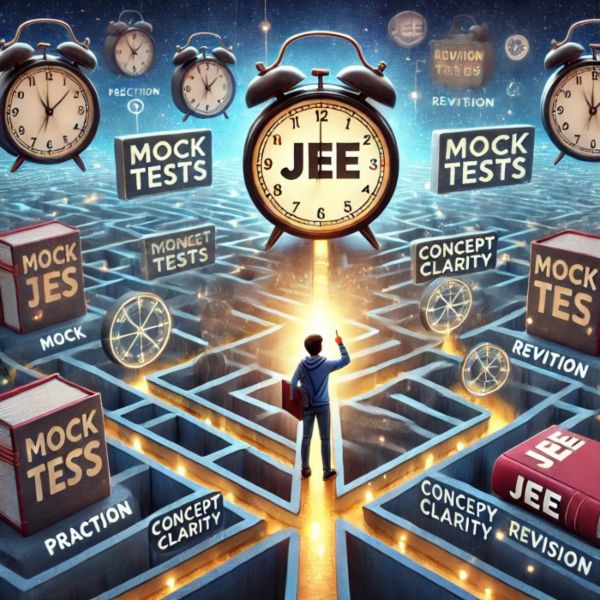JEE Full Form - Explained In Depth
By james michael |
Date 23-08-2024

Table of Contents
- JEE Full Form - Explained In Depth
- Historical Evolution of JEE
- Importance of JEE in Indian Education
- Basic Components of JEE
- Types of JEE Examinations
- Structure of JEE Things You Should Know
- How to Prepare for JEE?
- JEE Main Pattern Based Preparation Principles
- JEE Advanced Architecture
- Difference Between JEE Main and JEE Advanced
- Conclusion
Admissions Open for
The Joint Entrance Examination of JEE is an important gateway to engineering for Indian students. This is not just an examination but a gateway to entries in the foreign leads of engineering academies. More importantly, the first thing that a beginner must know is what is JEE, its types and its importance.
JEE Full Form - Explained In Depth
The Joint Entrance Examination of JEE is an important gateway to engineering for Indian students.
Overview of JEE: Key Facts
|
Aspect |
Details |
|
Full Form of JEE |
Joint Entrance Examination |
|
What is JEE? |
A national-level entrance exam for engineering aspirants |
|
Types of JEE |
JEE Mains & JEE Advanced |
|
Purpose |
Helps students secure admission to top engineering institutes like IITs, NITs, and other prestigious colleges |
|
JEE vs NEET |
JEE is for engineering, whereas NEET (National Eligibility cum Entrance Test) is for medical admissions |
|
IIT & JEE Connection |
Indian Institutes of Technology (IITs) accept JEE Advanced scores for admissions |
|
Why JEE is Important? |
Understanding JEE and its types helps students prepare effectively for engineering entrance exams |
|
Key Difference Between JEE & NEET |
While both are competitive exams, JEE is for engineering, and NEET is for medical school |
Historical Evolution of JEE
The JEE has undergone significant changes over the years to keep up with trends in education and the growing needs of the engineering profession.

Key Changes:
-
Journey of Evolution Through Time: There have been many changes in the Joint Entrance Examination (JEE) to keep up with trends in education and the growing needs of the engineering profession over the years.
-
Move Away From Rote Memorization toward Conceptualization:
-
Earlier the JEE was about memorizing and applying formulas directly.
-
Emphasis has now moved to conceptual understanding, analytical reasoning, and problem-solving abilities.
-
With students learning not just bare facts, but fitting them into a narrative that makes sense, this has made it so some students now have a stronger understanding of their subjects, not just the individual facts that come with that.
-
About JEE Main & JEE Advanced:
-
There was a one-tier exam earlier, so it was difficult to tailor it to a variety of institutions.
-
The advent of JEE Mains and JEE Advanced formed a multi-layer segregation.
-
JEE Main: Qualifying exam for NITs, IIITs and a few other top colleges
-
JEE Advanced: This takes place one day after JEE Main for students who wish to attend the IITs.
-
Such a system will enable greater participation and guarantee that only the most gifted students qualify to enter IIT.
-
New Exam Pattern & Changes in Syllabus
-
The syllabus has evolved over a long period to phase out obsolete topics and include relevant foundational concepts in line with modern engineering progress.
-
The exam pattern now consists of:
-
Questions requiring calculations, rather than multiple choice options.
-
Higher weights on how Physics, Chemistry, and Mathematics would work in the real world.
-
These changes allow students to demonstrate their critical thinking and invention ability.
-
Migration to Online Mode of Examination
-
Stepping back in time, JEE was held in a pen-and-paper format initially.
-
Since then, to make the process technologically updated and to make it more accessible, JEE Main is conducted in an online way (Computer Based Test).
-
Benefits of the online mode:
-
Lowers the chances of human errors that can accompany an evaluation.
-
Allows faster processing of your results.
-
Makes it more accessible to students in urban and rural areas.
Importance of JEE in Indian Education
JEE holds a significant position in the Indian education system as a gateway to opportunities and a measure of academic excellence.

Key Aspects:
-
A Gateway to Luxurious Life
-
JEE is not merely an entrance exam; it serves as a gateway to esteemed engineering institutions such as IITs, NITs, and IIITs.
-
This is a measure of a good academic level, filtering out those pupils whose aptitude and motivation is most suited to a rigorous engineering course.
-
Prominent Institutes: IITs and NITs
-
These schools are known for their intense curriculum, leading-edge research, and strong graduate networks.
-
The foremost global and national companies look for graduates from IITs and NITs.
-
Many graduates are already leaders in technology, entrepreneurship, and innovation.
-
JEE is not just a knowledge test but an immense part of education in India. This enables students to dangle their skills and expertise to check their eligibility to the most prestigious engineering institutions in the nation.
Basic Components of JEE
Three Key Aspects of JEE. Students preparing for JEE must know three important things about JEE: test pattern, syllabus and eligibility. These elements play a role in planning study groups and checking whether the candidates qualify or not.
-
Test Pattern
-
It consists of the number of questions, sections and subject-wise weightage.
-
Explains the scheme of marking with negative marking for incorrect answers.
-
It determines the timing of the exam, so plays a key role in pacing.
|
Paper |
Subjects |
Section A (MCQs) |
Section B (Numerical Value) |
|
Paper 1 (B.E./B.Tech.) |
Mathematics |
20 |
10* |
|
Physics |
20 |
10* |
|
|
Chemistry |
20 |
10* |
|
|
Total |
60 |
30 (Attempt 5 per subject) |
|
|
Paper 2A (B. Arch.) |
Mathematics (Part I) |
20 |
10* |
|
Aptitude Test (Part II) |
50 |
- |
|
|
Drawing Test (Part III) |
2 |
- |
|
|
Total |
72 |
10 (Attempt 5) |
|
|
Paper 2B (B. Planning) |
Mathematics (Part I) |
20 |
10* |
|
Aptitude Test (Part II) |
50 |
- |
|
|
Planning (Part III) |
25 |
- |
|
|
Total |
95 |
10 (Attempt 5) |
- Syllabus
-
-
Includes Physics, Chemistry and Mathematics topics based on the NCERT syllabus of Class 11 and Class 12
-
Realizing the regular syllabus assists the understudy in distributing his/her time successfully and focusing on high-weightage subjects.
-
|
Exam Mode: Computer-based (Online) |
|
Exam Duration: 3 Hours |
|
Subjects: Physics, Chemistry, and Mathematics |
|
Total Number of Questions: 90 (30 Physics + 30 Chemistry + 30 Maths) |
|
Question Types: MCQs and Numerical Questions for Each Subject (PCM) |
|
Maximum Marks: 300 |
|
Marking Scheme: MCQ: Correct Answer = +4, Incorrect Answer = -1, Unattempted Answer = 0 Numerical Question: Correct Answer = +4, Incorrect Answer = -1, Unattempted Answer = 0 |
|
Exam Languages: English, Hindi, Gujarati, Assamese, Bengali, Kannada, Malayalam, Marathi, Odia, Punjabi, Tamil, Telegu and Urdu |
- Eligibility Criteria
-
-
Sets the minimum eligibility criteria to register for JEE.
-
These comprise age limits, the number of attempts, and academic qualifications.
-
Students have all the prerequisites required for applying for the exam.
-
JEE Main and JEE Advanced:
-
Students mostly are confused: what is JEE? It is a national exam that allows students to gain admission to elite engineering schools, including the Indian Institutes of Technology, or IITs.
-
There are two levels of the National Joint Entrance Test (JEE) — JEE Main and JEE Advanced. So, if JEE Main lets go of the airspace in many individual engineering colleges such as NITs, JEE Advanced only advocates the granting of seats into IITs
-
Exam Type: MCQ + 2 papers (Paper 1: B.E./B.Tech and Paper 2: B.Arch). /B.Planning.
-
Admission Criteria: Students must obtain at least 75% of marks to be eligible for taking JEE Main after the successful completion of their 10 + 2 test.
-
Of note: The JEE is the admissions path to India's top engineering schools, including the Indian Institutes of Technology (IITs), National Institutes of Technology (NITs) and other technical institutes.
Types of JEE Examinations
Indian Joint Entrance Examination (JEE) is one of the most important entrance examinations for admission in top engineering and technology institutes in India. It is an entrance test for admission to top institutes such as the the Indian Institutes of Technology (IITs), National Institutes of Technology (NITs), and other centrally funded technical institutions (CFTIs) JEE Main, primarily assesses candidates in terms of their understanding and application of knowledge in Physics, Chemistry and Mathematics at 10+2 level.. While the former tests the conceptual comprehension and application in intricate scenarios, the latter tests the deeper understanding of the concepts.
Structure of JEE Things You Should Know
The JEE consists of two parts or levels and evaluates a student’s aptitude, analytical ability, and knowledge of the subjects:
JEE Main
-
The exam is held by the National Testing Agency (NTA).
-
It is the first stage or qualification exam for the JEE advanced.
-
It has 3 core subjects: Math, Physics and Chemistry.
-
Provides direct admission eligibility for NITs, IIITs, and other state/central government-sponsored institutions.
-
This also provides a chance for the students to retake the exam and score well as there are two sessions in a year.
JEE Advanced
-
It is jointly conducted by one of the IITs on a rotational basis.
-
Only qualified students of the joint entrance exam are allowed to take the exam.
-
This paper is tougher and is more concept-based when compared to JEE Main.
-
It is the right to what are the world's most widely acknowledged institutions for engineering and research: the IITs.
How to Prepare for JEE?
Being one of the toughest exams in India JEE requires students to have a strategic plan to be successful:
-
Understand concepts very well: You should know fundamentals very well to design solutions to complex problems.
-
Must be good at Mathematics, Physics, and Chemistry: These three subjects form the basis on which the JEE examination is conducted.
-
Read Sample Papers & Mock Tests Regularly: A Mock test helps in understanding the type of questions.
-
Familiarizing yourself with past papers can reveal important trends and question types.
-
Mock tests can also help you with both time management as well as accuracy: Completing the exam work within the given time frame is very important, and is something that only mock tests can help you with.
-
Many students prefer coaching institutes, such as FIITJEE, Allen, Aakash, and Resonance, which provide structured preparation.
-
Grazing time management & checklists for studies that really work: Having a well-disciplined study plan is very much essential for covering the syllabus in an effective manner.
-
Theory solving and revision: 3:1 ratio
-
Reading NCERT books, then moving to read at advanced reference books: NCERT books will help you to build up a strong base.
JEE Main Pattern Based Preparation Principles
JEE Main: The Joint Entrance Examination Main or JEE Main is a national level entrance examination that is being conducted for aspiring candidates who are seeking admission into undergraduate engineering programs offered by the National Institutes of Technology (NITs), the Indian Institutes of Information Technology (IITs) and other prestigious engineering colleges in India.

Key Aspects of JEE Main
-
JEE Ranking System:
-
Normalization: The process of calculating the JEE Main score in VARC is done through normalization which is done using the difficulty level of the JEE (Main) examination is varied across different sessions.
-
Percentile Score: Percentile Score means that this score is not best on the number of correct questions but the performance of the student when compared with other students.
-
AIR: All India rank is used to check the college in which you get admission higher in a rank the college where you will enter in a premium.
-
JEE Cutoff Marks:
-
Category-Wise Cutoff: General, OBC, SC, ST, and EWS cutoff marks differ.
-
College-wise Cutoff: Cutoff varies from each NIT, IT, and GFTI (Government Funded Technical Institute) as per past trends.
-
Eligibility Change for JEE Advanced Students must take JEE Main as it is compulsory for admission to IITs; hence JEE Advanced is only for students for whom the score is above the earlier cutoff.
-
Factors Affecting JEE Cutoff
-
Toughness of the exam (difficult papers can decrease cutoff).
-
No. of candidates who appeared in the exam (Heavy competition may raise the cutoff)
-
Total Available Seats in Colleges (fewer seats, higher the cutoff)
JEE Main Admission: A Step-wise Process
-
A Jee Coaching institute will help them to prepare well for the Jee Main exam. These places give comprehensive study materials alongside experts who teach the training. These sources make students familiar with the pattern and the topics of the exams which improves their chances of clearing them in the first attempt.
-
JEE Main preparation: 5 important tips to keep in mind
-
Get to know the structure and components of the exam.
-
Create a study schedule and stick to that schedule.
-
If not, glance and figures, the special case of huge amount of information.
-
Join a reputed Jee coaching institute.
Students can accomplish much if these tips and reliance on these aspects of education accompany them. Browse through the JEE cutoff marks for the college of your choice and plan your roster accordingly.
JEE Advanced Architecture
Students felt confident with the help of JEE previous year papers. So this helps a study plan and spots weaknesses. They ensure that the process of JEE online applications is user-friendly so that the students don’t face any hassles while registering on the website.
The Joint Entrance Examinations are divided into two stages JEE Main and JEE Advanced. The exam equals two papers and two papers equals three hours. It’s a test to demonstrate your knowledge of physics, chemistry and math. The first step towards preparing for this challenge is understanding what the JEE Advanced is all about. The entrance exam is difficult but students can achieve success through hard work. They just need to keep grinding and achieving their goals.
|
Number of Papers: 2 (Paper-I and Paper-II) – Both are compulsory |
|
Exam Mode: Computer-based (Online) |
|
Duration: 3 Hours each for Paper-I and Paper-II (4 hours for PwD-person with Disabilities) |
|
Number of Sections: 3 (Physics, Chemistry, Maths) |
|
Number of Questions: Varies |
|
Question Types: Multiple Choice Questions (with one or more correct options), Numerical-based Questions, Matching List Questions |
|
Question Paper Languages: English and Hindi |
JEE Advanced Preparation Tips:
These are also the weekends of the JEE Advanced, which is not just a competitive exam but also a test of endurance.
-
Having sound knowledge about the pattern and syllabus of the examination.
-
It is a preparation for the exams by solving the previous year's papers.
-
Stay on top of the best stories with inbox delivery of the latest news and developments.
Difference Between JEE Main and JEE Advanced
|
Feature |
JEE Main |
JEE Advanced |
|
Purpose |
Admission into NITs, IIITs, and other engineering colleges. |
Admission to IIT, other premier organisations |
|
Difficulty |
Relatively easier. |
Harder, requiring a conceptual understanding. |
|
Exam Pattern |
Multiple choice questions (MCQs), and numerical value questions. |
Multiple choice questions, numerical value type questions, and descriptive type questions. |
|
No. of Attempts |
Number of attempts (please see minimum guidelines) |
Only JEE Main qualified candidates can sit for limited attempts (see guide) |
Tips for Smart Preparation JEE The road to success in JEE is not just a struggle; it is a combination of planning and hard work. Here
Conclusion
The JEE is a challenging but rewarding examination that opens doors to a bright future in engineering. By understanding the exam pattern, syllabus, and preparation strategies, students can increase their chances of success and achieve their dreams of studying at one of India's top engineering institutions.
Liked the blog? Then share it with everyone and let your entire community know about these JEE full forms and JEE abbreviation.
Related Blogs
ICSE Full Form: Explore the full form of ICSE, its historical background, and more in our detailed tutorial.
MPSC Full Form: Discover the meaning, history, and additional information about MPSC.
UPSC Full Form: Find out everything about UPSC, including its full form, historical context, and more.
ICSE vs CBSE: Compare the differences between the CBSE and ICSE educational boards.
CBSE Full Form: Understand the full form of CBSE, its history, associated offices, and more.
NCERT Full Form: Learn about NCERT, including its solutions, historical development, syllabus, and benefits.
NEET Full Form: Learn about NEET, including its syllabus, and benefits.
CBSE Schools In Popular Cities
- CBSE Schools in Bangalore
- CBSE Schools in Mumbai
- CBSE Schools in Pune
- CBSE Schools in Hyderabad
- CBSE Schools in Chennai
- CBSE Schools in Gurgaon
- CBSE Schools in Kolkata
- CBSE Schools in Indore
- CBSE Schools in Sonipat
- CBSE Schools in Delhi
- CBSE Schools in Rohtak
- CBSE Schools in Bhopal
- CBSE Schools in Aurangabad
- CBSE Schools in Jabalpur
- CBSE Schools in Jaipur
- CBSE Schools in Jodhpur
- CBSE Schools in Nagpur
- CBSE Schools in Ahmednagar
- CBSE School In Tumkur

Call Us to know more about Orchids
Swipe Up

















